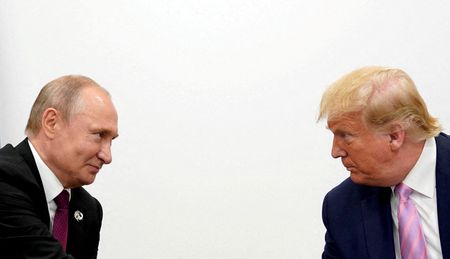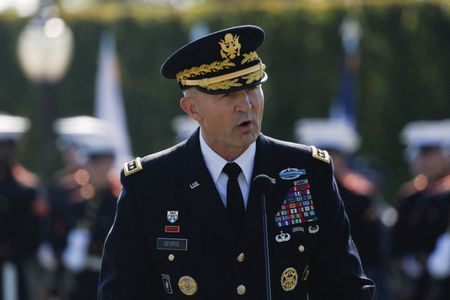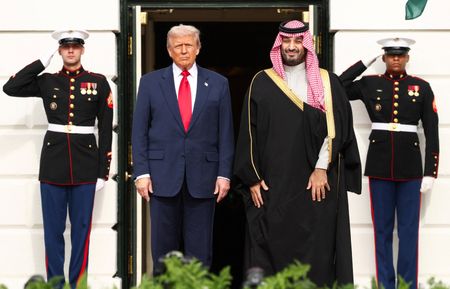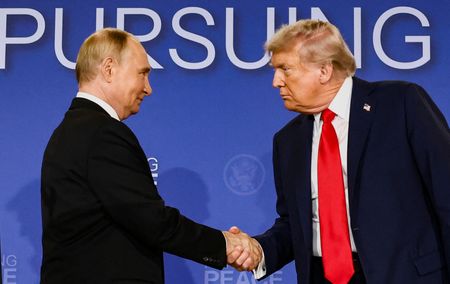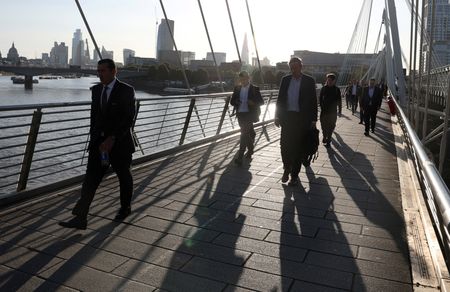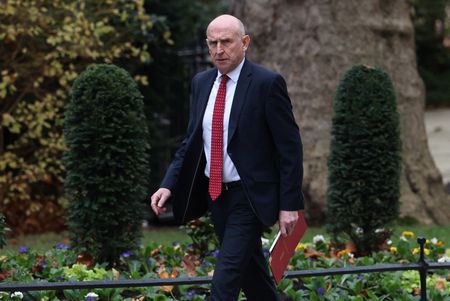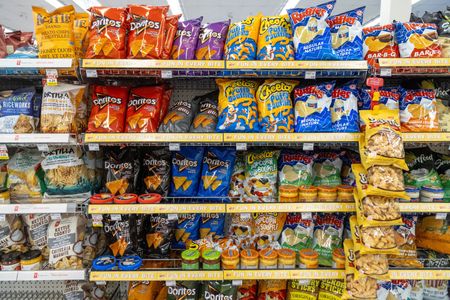By Guy Faulconbridge and Dmitry Antonov
MOSCOW (Reuters) -Russia’s point man for relations with the United States said on Monday that all of President Vladimir Putin’s conditions must be met in full before the war in Ukraine can end, suggesting Moscow is playing hardball with U.S. President Donald Trump.
Russia’s foreign minister drove the point home, saying that while Moscow was ready for talks with Ukraine, results could be achieved only if the “fundamental reasons” behind the nearly three-year-old conflict were resolved.
Trump, who has repeatedly said he wants to end the war in Ukraine swiftly, after hundreds of thousands of deaths, said on Sunday he thought he was making progress, though he has not set out how he hopes to end the conflict.
Asked whether he had had a conversation with Putin since he became president on January 20 or before, Trump told reporters on Air Force One: “I’ve had it. Let’s just say I’ve had it.”
The Kremlin refused to either confirm or deny the contact.
Moscow swiftly underscored that its maximalist demands – as set out by Putin last June – remained the opening bid at the outset of the negotiations.
The “political solution as we envisage it cannot be achieved otherwise than through the full implementation of what was pronounced by President Putin when he spoke to the Russian Foreign Ministry in June,” Deputy Foreign Minister Sergei Ryabkov told a Moscow news briefing in English.
“This is where we are and the sooner U.S., Britain and others understand it, the better it would be and the closer this desired political solution will be for everyone,” said Ryabkov.
In Putin’s June 14 speech to the Foreign Ministry, he set out his terms: Ukraine must drop its NATO ambitions and withdraw its troops from the entirety of the territory of four Ukrainian regions claimed and mostly controlled by Russia.
Russian Foreign Minister Sergei Lavrov, in an address marking Diplomatic Service Day, restated that Moscow was ready for talks “in which our legal national interests are upheld”.
“Not the interests of others, but in the context of agreements on an all-encompassing security system in which no one is hurt,” Lavrov said.
But any settlement, he said, depended on the “full and irreversible removal of the conflict’s fundamental reasons,” including Ukraine’s drive to join NATO and the “extermination” of all aspects of Russian language and culture in Ukraine.
Kyiv, which wants to join NATO and wrest back control of lost territory if it can, said at the time that such conditions would be tantamount to surrender.
The conflict in eastern Ukraine began in 2014 after a Russia-friendly president was toppled in Ukraine’s Maidan Revolution and Russia annexed Crimea, with Russian-backed separatist forces fighting Ukraine’s armed forces.
In February 2022, Putin triggered full-scale war by sending in thousands of troops.
Trump, while campaigning, promised to end the war in a day, and U.S. officials have had discussions with Ukraine and Russia on ending the deadliest conflict in Europe since World War Two.
Putin said what he calls a “special military operation” was needed to protect Russian speakers in Ukraine and counter what he said was a grave threat to Russia from potential Ukrainian membership of NATO.
U.S. APPROACH TO UKRAINE
Ryabkov, a career diplomat who also oversees arms control, said Russia did not see a major change in the U.S. approach to Ukraine, and cautioned Moscow would not be spoken to in the language of ultimatums.
“Without solving the problems which were the root causes of what is happening, it will not be possible to reach an agreement,” Ryabkov said. “So variations and half-measures are not the path we are prepared to go along.”
Ukraine and its Western backers, led by the United States, have accused Russia of trying to conduct a colonial-style land grab, and Kyiv’s supporters have vowed to defeat Russian forces by supplying hundreds of billions of dollars worth of weapons.
Moscow controls about 20% of Ukraine, including Crimea and four regions in eastern and southern Ukraine.
Though Russia claims the entirety of the four regions as wholly part of Russia, its forces on the ground control 70% to 80% of the territory with about 26,000 square km (10,039 square miles) still held by Ukrainian troops, open-source data on the front line shows.
Reuters reported in November that Putin is open to discussing a Ukraine peace deal with Trump but rules out making any major territorial concessions and insists Kyiv abandon ambitions to join NATO.
Ukrainian President Volodymyr Zelenskiy told Reuters on Friday that he wanted Ukraine to supply the U.S. with rare earths and other minerals in return for financial support for its war effort.
(Reporting by Dmitry AntonovWriting by Guy Faulconbridge Editing by Andrew Osborn, Ron Popeski, Ros Russell and Rod Nickel)

